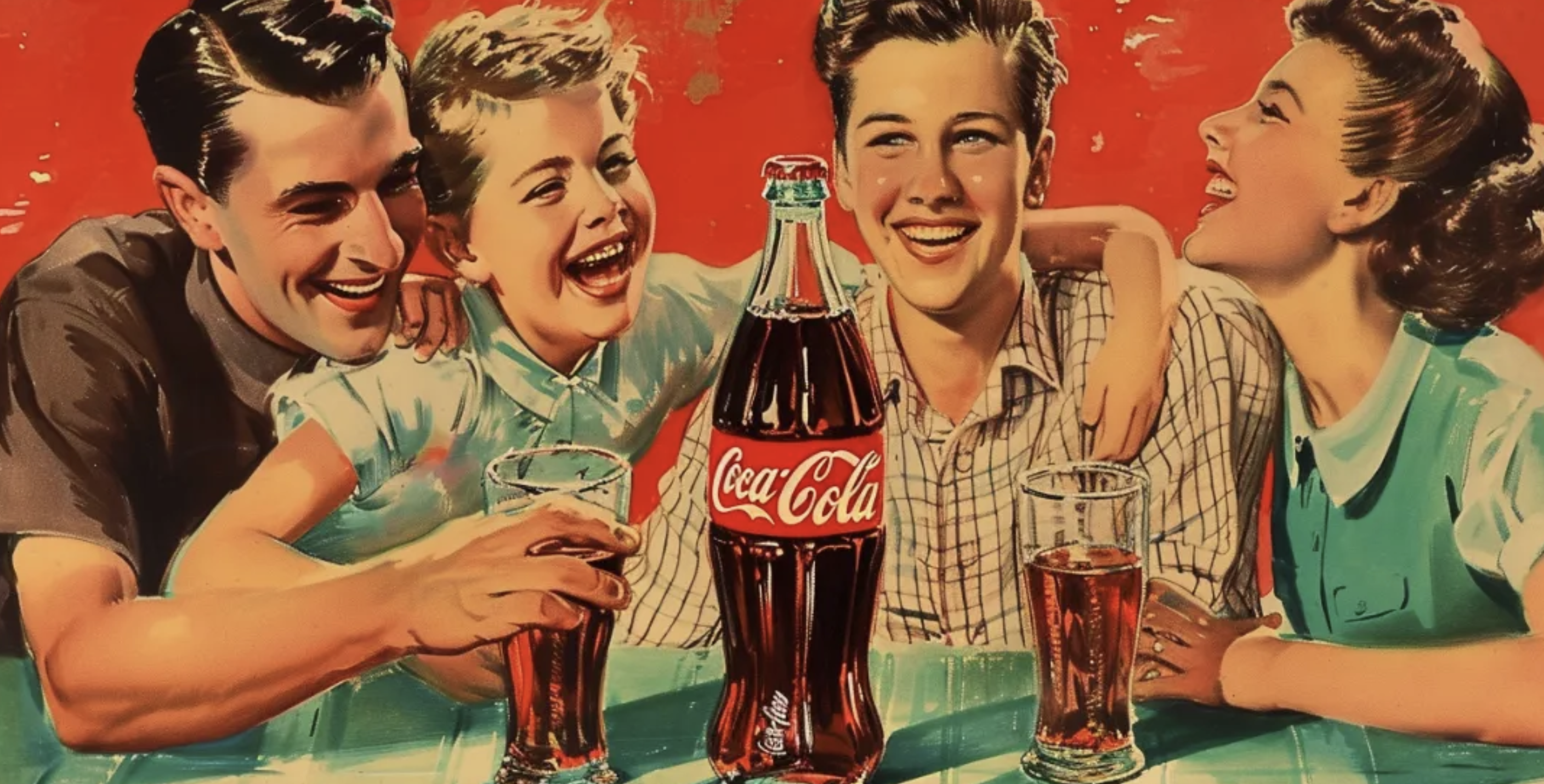
A common click-bait technique is to write a blog post with “The death of …” in the title. I’ve learned to ignore these, but I’ve seen such an avalanche of headlines with some version of “the end of brands” that it was time to comment. It’s not just a sensationally ridiculous idea, it’s a dangerous one.
I’d like to insert some common sense into the dialogue and explain why brands are more important than ever.
What is a brand?
Let’s take it from the top. A brand is an emotional expectation.
Here’s a little exercise I use in my classes: If I told you Coca-Cola was building a hotel in your city, could you imagine what it looks like?
Your mind immediately starts painting: Red velvet everywhere. Curved, flowing architecture like a bottle. A fountain in the lobby bubbling with happiness. The air smells like vanilla and spice. Even the receptionist’s smile sparkles.
You can see it, can’t you? Feel it? Hear it?
That’s a brand.
It’s not about sugar water. It’s about an emotional promise that’s so strong, so consistent, you could architect an entire building around it.
 You can count on this “Coke feeling” in any circumstance, in any place. The trust in this consistency keeps that company at the top of your mind and maybe even at the top of your heart, almost everywhere in the world.
You can count on this “Coke feeling” in any circumstance, in any place. The trust in this consistency keeps that company at the top of your mind and maybe even at the top of your heart, almost everywhere in the world.
It doesn’t appeal to everyone, especially if you are health-conscious, for example. But the brand means something to enough people to make a difference, and make a profit.
There is no utilitarian advantage of a pair of 20-year-old Nike Air Jordans selling for thousands of dollars in Japan. There are better shoes, even pricier shoes. But this shoe makes us FEEL something and that makes it rise above the fray.
Creating this emotional shorthand isn’t easy. It’s like composing a symphony that plays in people’s hearts every time we see a logo.
But here’s why it’s worth it: When everyone else is competing on features and price, you’re competing on feelings.
And feelings? They’re priceless.
There are a few reasons critics claim brand marketing is in decline (or dead!). Let’s knock those down:
1. The Customer is in Control
One reason critics cite for the diminishing importance of brand marketing is the shift in power between businesses and consumers. In the past, brands held sway over public perception because they controlled the narrative through traditional media channels. Today, the internet has democratized influence, empowering consumers to control the narrative through their opinions, reviews, and posts.
I’ve written about this extensively, most notably in the book Marketing Rebellion, which suggests that nearly all the power to drive sales is in the hands of the customer. This doesn’t mean brand marketing is dead. It means that we can’t count on advertising any more. The new imperative is to create value and experiences so insanely great that people can’t wait to spread the word.
The Real Job of Brand Marketing Today:
- Stop trying to control the narrative (you can’t)
- Start creating experiences worth talking about
- Give your customers something so amazing they become volunteer marketers
The customer is the brand marketer. How do we help them do the job?
2. The Rise of Performance Marketing
Over the past 25 years, performance marketing (SEO, targeted ads, etc) gained prominence over traditional brand marketing. Businesses love how advanced analytics tools can track and measure the effectiveness of their campaigns in real-time. By comparison, assigning sales attribution to brand-building activities can be difficult or impossible.
Performance marketing is vital to many companies, especially early-stage companies that need to fill a pipeline and generate customers fast. But arguably, in the end, the brand is all you have to differentiate yourself.
In my book Audacious: How to Win in an AI Marketing World, I feature a case study on Liquid Death, the fastest-growing beverage in the world — a five-year-old startup! Founder Mike Cessario said:
“You’re only going to win with branding. You won’t win with some functional ingredients you can’t own. In that case, when you’re big enough, Coke or Pepsi or someone else will just produce the same thing—same ingredients, cheaper, more widely distributed, and then you lose. With water, there’s minimal, if any, functional difference between the brands. The difference is purely marketing. People want to walk around with this thing instead of that thing. None of the water brands were interesting. I did my homework. There was a huge opportunity to tell a different story.”
A successful company can’t stick with only performance marketing in the long-term. Building brand awareness powers long-term growth. When consumers recognize and trust your brand, performance ads become more effective. Case studies show that smart brand marketing can slash Customer Acquistion Cost by up to 70%.
Branding creates distance between you and your competitors, paving the way for future growth.
3. The Commoditization of Products and Services
Some say that the commoditization of many industries is killing brands.
Perhaps the poster child for this argument is Temu. Temu is an eCommerce company that ships generally non-branded, low-cost commodity products directly from Chinese factories. It is a company that has exploited digital technology and eCommerce psychology to the maximum and pioneered a new way to serve bargain basement shoppers.
Here’s the thing about Temu: They’re not killing brands. They’re just showing us what happens when price is the only story you need to tell.
There has always been a segment of consumers who love to hunt for bargains instead of brands for economic necessity or perhaps just for fun. Temu has digitized the treasure hunt.
Side note: I predict that at some point, Temu will create its own simple, reliable branded products, just as Amazon did. So, brand would matter, even in the commodity sphere.
4. Categories?
A recent exchange on LinkedIn offered an idea that creating “categories” is more important than brands.
Here’s an example: Dude Wipes. This company created a better, environmentally-sensitive way to wipe your rear. I literally never thought I would use those words in a blog post, but there you go.
Let’s break this down, from the bottom-up (pun intended)!
Dude Wipes didn’t just create a category — “premium man-focused bathroom hygiene.” They built a brand that makes guys feel okay about buying fancy toilet paper.
But creating a category without building a brand is like inventing a new sport and not telling anyone about the rules. Being first means nothing if you’re also forgotten first. Your brilliant new category is a sitting duck if you don’t wrap it in brand awareness. Your competitors are watching, waiting, and probably have deeper pockets than you do.
Look at what happened to:
- Friendster (created social networking, Facebook owned it)
- Zune (an early device to carry songs in a small device)
- Palm Pilot (invented PDAs, now a trivia question)
They all created categories. They all got steamrolled by brands that did it better.
Category without brand is silly.
5. The Impact of Social Media Influencers
Social media has fundamentally altered the way consumers interact with brands. Influencers, who often have more authentic connections with their followers, have emerged as powerful voices in the marketplace. Rather than relying on brand-created content, consumers turn to influencers for recommendations, reviews, and inspiration.
Hey … it’s still a BRAND! Whether it’s a person or a product, you’re still creating an emotional expectation. And the influencer is a lot more effective if their audience has heard of the brand!
Branding Forever
There is simply no rational argument for the declining importance of brand marketing. In fact, it is more important than ever, especially in an AI world. Here are a few quick takes:
- Branding alone creates differentiation in a crowded marketplace (like Liquid Death!)
- Brands are beacons of trust in a world of deep fakes and misinformation
- Branding isn’t replaced by “categories” or performance marketing. It enhances these initiatives.
- Loyalty to a brand enables consumer brand advocacy and influencer marketing.
- Brands and brand stories resonate across generations.
- In times of crisis, a well-established brand is better positioned to weather the storm.
- Brand trust and recognition is the fuel of international expansion.
In a world where anyone can make anything, brands are the difference between:
- Trust and uncertainty
- Loyalty and indifference
- Premium prices and commodity status
Declaring the death of brands isn’t just wrong — it’s like declaring the death of trust, loyalty, and human connection.
 Need a keynote speaker about the future of marketing? Mark Schaefer is the most trusted voice in marketing. Your conference guests will buzz about his insights long after your event! Mark is the author of some of the world’s bestselling marketing books, a college educator, and an advisor to many of the world’s largest brands. Contact Mark to have him bring a fun, meaningful, and memorable presentation to your company event or conference.
Need a keynote speaker about the future of marketing? Mark Schaefer is the most trusted voice in marketing. Your conference guests will buzz about his insights long after your event! Mark is the author of some of the world’s bestselling marketing books, a college educator, and an advisor to many of the world’s largest brands. Contact Mark to have him bring a fun, meaningful, and memorable presentation to your company event or conference.
Follow Mark on Twitter, LinkedIn, YouTube, and Instagram


